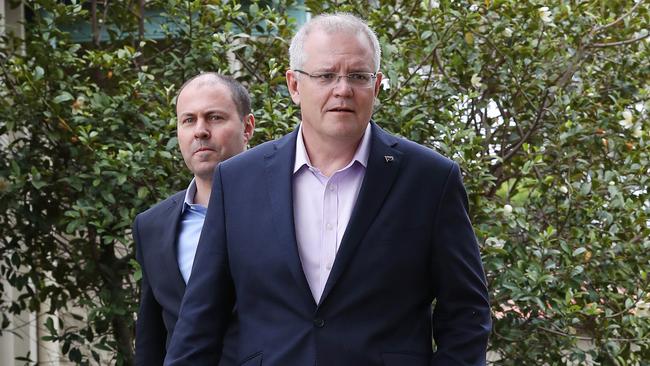
Wentworth was hit by a perfect political storm — the lethal transaction costs of the Liberal leadership crisis, the unique “resentment” factor at Malcolm Turnbull’s removal and serial exposure of climate change, gay rights and refugee issues in the final fortnight.
While the vote remains on a knife-edge, the price of removing Turnbull is likely to be the consignment of Scott Morrison to minority government that will weaken his authority, empower his opponents and prejudice the passage of any contentious legislation.
The first lesson from Wentworth is don’t change prime ministers when you have a one-seat majority. The second is the Liberals face a devastating general election defeat unless they rediscover unity and discipline, probably a forlorn cause. The third is beware the high-profile community-based independent, often a woman, able to tap resentment at the government’s performance.
The broader dilemma is the tribalisation of Australia and the rise of single-issue culture wars, which stretch to breaking point the divisions in centre-right politics that must span both rural conservatism and urban progressivism. This task is tearing the Liberals apart. An anti-Turnbull surge is inevitable if Kerryn Phelps wins the seat.
Morrison confirmed yesterday that both Dave Sharma and he had unsuccessfully asked Turnbull for a declaration of support. “I will be honest about it: those approaches were made,” Morrison said.
Turnbull’s refusal will fuel a backlash against him, likely to become more intense the more narrow is any Sharma defeat. The bigger reality, however, was the disastrous storm of issues in the final fortnight of the campaign typified by climate change, the huge publicity over the threat to gay students, concern about children on Nauru, chaos over the Pauline Hanson white racism gimmick and the foreign policy changes regarding Israel.
Morrison cannot escape blame for the government’s performance in the final disastrous fortnight — yet it is wrong to saddle him with the main blame for a by-election he wanted to avoid in the first place. Sharma was an impressive candidate at his first outing. His likely defeat is a commentary not on him but the Liberal Party.
Wentworth is not Australia. Its commitment on climate change action far exceeds that of most of the country. Morrison and Josh Frydenberg are right to reject any knee-jerk policy reversals, but they need to build a greater sense of unity, governing stability and values clarity about the Liberals, tasks that are probably beyond the party in its current condition.
If forced into minority government, Morrison will be reduced to dangerous dependence on the crossbenchers. While Labor is demanding a general election, there is no substantive reason for the crossbenchers to succumb to such immediate demands.
Morrison and Frydenberg insist they will be able to govern until the election is due next year.
Yet minority government will transform the atmospherics of politics. It will create a media frame that focuses on risk and crisis. It will become more difficult for Morrison to set the agenda.
The ability of Labor and the government’s opponents to further weaken Morrison is immense: witness the prospect of referring Peter Dutton’s position to the High Court over section 44 of the Constitution.
The irony of this result is that it coincided with strong economic news for the government — unemployment falling to 5 per cent and a win on cutting the corporate tax rate to 25 per cent for business employing millions of workers. The political dividend from economic performance has fallen in recent years but Morrison’s only prospect is to anchor the economic debate at the heart of politics.
Morrison said after the results that the Liberals had “paid a great price for the events of a few months ago”, referring to the leadership upheaval. Manager of opposition business Tony Burke said yesterday: “The people of Wentworth made a very clear statement that they’ve had enough of the instability. They’ve had enough of the division.”
The disease that ravages the Liberals is entrenched division and instability — this is the real message of Wentworth. If political instability defines the Morrison government, the Liberals will suffer a shattering election defeat.
It is true Turnbull should not have resigned and caused a by-election, but the party needs to move beyond citizen Turnbull and needs to stop obsessing about Turnbull.
If it cannot, then it will pay a fearful price.




